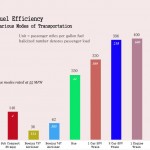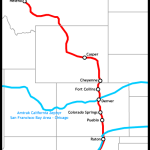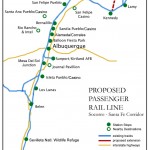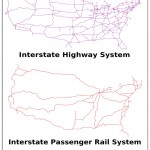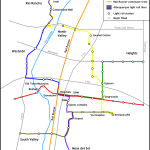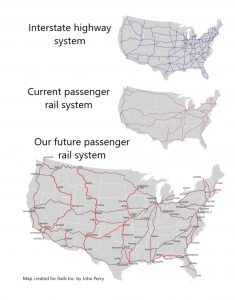Here are some key articles about high speed rails in New Mexico. They make up the core of what we’re calling the High speed Rail Primer.
Author Archives: admin
Everybody but Us?
- Phoenix has voted for extensive transit improvements, including a light rail system.
- Salt Lake City’s new light rail line is being ridden in huge numbers.
- Denver is opening a new eight-and-a-half mile extension this summer, and yet another has been approved. Ridership is now over 33,000 a day on the entire light rail system, more than 40% over projections. Ridership at two station locations already exceeds projections for the year 2015.
- Dallas/Fort Worth The Trinity Railway Express is now complete between downtown Dallas and downtown Fort Worth and is building an extension to the DFW Airport. The trains are full. The DART (Dallas Light Rail Line) is expanding rapidly and ridership is exceeding expectations. Fort Worth is working on their own light rail system.
- Houston has begun construction of their own light rail system.
- Calgary in Alberta, Canada boasts the first transit system in North America to completely power its light-rail via wind-generated electricity. Their C-Train is 100% emission-free.
-
The Santa Fe Southern Railway is working with county and city leaders and a private developer to initiate a modern commuter line connecting Santa Fe, the SF Community College, and El Dorado.
Comments Off on Everybody but Us?
Posted in Posts
5-Point Program
(1) Completion of modern railroad track from the main track into downtown Santa Fe.
(2) A modern Commuter Rail line on existing tracks running several times daily between Bernalillo and Belen, to be quickly expanded to Socorro-Santa Fe. This system to include park-and-ride facilities and bus/van shuttles to important nearby destinations. All facilities to be pedestrian, wheelchair, and bicycle friendly.
(3) Restoration of Amtrak Superliner or similar rail service from El Paso through Albuquerque and Raton to Denver, with appropriate connecting services.
(4) A couple of carefully selected Light Rail (or Modern Street car) lines within the Albuquerque area, including park-and-ride facilities at major destinations and intersections. These lines to be installed using the latest in inexpensive track-laying technology within existing boulevard space.
(5) A publicity campaign along the lines of those for seat belts and sober driving to promote ridership.
UPDATE, 2010:
Points 1 and much of 2 have been realized. Besides Points 3,4 and 5, we are promoting what we call the “Rail Interstate”; the restoration of a full national Rail network, much like we had 60 years ago. We think we should be able to go everywhere by train (even at a modest 70-80 mph) that we can now drive or fly (see Our Road And Rail Maps, at left).
Is this just a solution in search of a problem? See What’s at Stake.
Comments Off on 5-Point Program
Posted in Posts
The Keystone
Like the keystone in an arch, rail is the anchor for a healthy inter-modal transportation system. For instance, commuter and light rail systems have been shown to increase bus and bicycle use, as well as walking. Rail solves the problems brought on by increasing congestion and over-reliance on the automobile.
- Rail has . . .
- low fuel consumption per ton/mile or passenger/mile.
- a small “footprint” on the land compared to other major modes.
- a smoother, faster, less stressful ride.
- a very low injury and fatality rate.
- Rail promotes . . .
- more efficient and sustainable use of materials, such as steel wheels versus rubber tires.
- renewal of old buildings and neighborhoods – even toxic waste sites.
- financial savings for the public compared to automobile expenses.
- Rail is . . .
- compatible with other modes of transit, including bicycles, foot power, wheelchairs, buses, and shuttles.
- compatible with smart growth.
- compliant with environmental and traffic laws.
- much quicker and cheaper to put back in service after a man-made or natural disaster.
- readily adaptable to solar, wind and other renewable energy sources.
Comments Off on The Keystone
Posted in Posts
Modest Proposals
- J.W. Madison & D.C. Gravning Getting Transportation On TRACK
An op-ed piece in The Albuquerque Tribune making the case for passenger rail. - RAILS, Inc Letter Sent to all Mayoral Candidates
September 9, 2001 - Jon Van Buskirk A Rocky Mountain Rail Route?
July 20, 2002 - Rails, Inc. Our Wish List for 2012
November 3, 2002 - Rails, Inc. An Energy/Transportation Fantasy for New Mexico
2002 - J.W. Madison, Rails, Inc. A letter to our elected representatives
March 23, 2004 - J.W. Madison, Rails, Inc. Rocky Mountain Flyer
December 16, 2007 - Light Rail Now LA BRT – Just Like Rail, But Cheaper?
December 16, 2007 - James C. Green Montana Association of Railroad Passengers
January 07, 2008 - Rails, Inc. Rocky Mountain Flyer – PDF
September 2008
Comments Off on Modest Proposals
What’s at Stake?
- Your Space
- At least 30% of downtown Albuquerque is devoted to roads and parking.
- New roads and suburban sprawl are eating up open space, farm land, and long-established neighborhoods.
- Your Money
- The cost of personal transportation is more than 20% of most families’ budgets.
- The recent reconstruction of the Big I, though well executed, cost over $200,000,000 and will not solve our traffic problems for very long.
- Your Air
- Personal vehicle miles travelled are currently increasing 3 times as fast as our population.
- A proposed power plant in the South Valley would increase by 6 times the industry-derived air pollution over Albuquerque. By law, that increase would have to be met by a decrease in other pollution sources, such as motor vehicles.
- Your Community
- New Mexico’s cities can no longer afford to provide roads and utilities to new communities and fully maintain exiting neighborhoods.
- Albuquerque’s bus system is skimpy and incomplete. Many people can’t or won’t ride it.
- Getting to work, school, or entertainment is becoming more expensive, time-consuming, stressful, and dangerous.
Comments Off on What’s at Stake?
Posted in Posts

